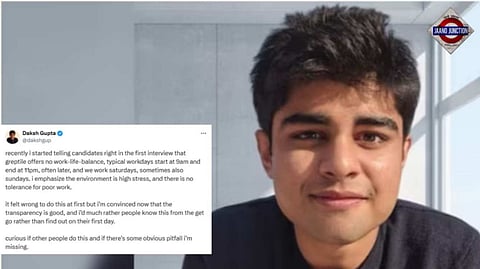

An Indian-origin CEO of an AI startup claimed that he has received multiple “death threats” after sharing that his company operates on an 84-hour workweek with “no work-life balance.”
Daksh Gupta, CEO of Greptile, sparked controversy after detailing the company’s intense work culture in a viral post. He explained that workdays typically begin at 9 am and end at 11 pm or later, with Saturdays being regular workdays and occasional work on Sundays.
“Recently, I started telling candidates right in the first interview that Greptile offers no work-life balance. Typical workdays start at 9 a.m. and end at 11 p.m., often later, and we work Saturdays, sometimes also Sundays. I emphasise the environment is high stress, and there is no tolerance for poor work. It felt wrong to do this at first but I am convinced now that the transparency is good, and I’d much rather people know this from the get go rather than find out on their first day. Curious if other people do this and if there is some obvious pitfall I am missing,” Gupta said in a post that soon went viral with over one million views.
The internet reacted strongly, with many criticising Gupta for promoting a “toxic work environment” and having a “terrible mindset.” While some appreciated his transparency, they added, “As long as you're paying employees fairly, it’s fine. Otherwise, it’s modern-day slavery.”
Amid the backlash, Gupta addressed the criticism in a follow-up post, revealing that his inbox was now “20% death threats and 80% job applications.”
“Now that this is on the front page of Reddit and my inbox is 20% death threats and 80% job applications, here’s a follow up - to everyone who is overworked and underpaid at their software jobs esp outside the US, I feel for you, and i’m sorry this struck a nerve. The people that work here had 6-fig 20 hr/week jobs before this, and can go back to them any time. It might be hard to believe but there exist people that want this, while a minority. The transparency exists to identify them.”
Gupta also clarified that the demanding work environment was temporary, aimed at the early stages of startup growth.
“This way of working isn’t supposed to be forever because it isn’t sustainable. It’s the first year or two of a startup which is like reaching escape velocity. Like people said in the comments, as we mature we’ll hire older, more experienced people who have families and can’t work 100 hours a week, and naturally we would adapt like any good organisation,” he explained.
He further emphasised that this approach was not a universal blueprint for success: “This is NOT meant to be prescriptive. There are brilliant people who run successful companies full of brilliant people that don’t push themselves this hard. Many other started the way we are starting. Lot of indian hate coming from this post so i want to clarify that i am like this not because I’m Indian but because I’m San Franciscan.”
There have been mixed responses to Daksh Gupta’s new post as a conversation ensued in the comments section about transparency, employee well-being, and fair labour practices.
